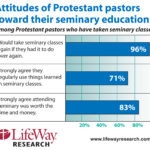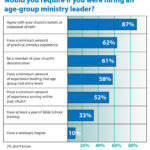NASHVILLE, Tenn. — Protestant pastors put high value on their seminary education and regularly integrate their learning into the way they lead and serve their congregations, newly released information from Lifeway Research shows.
The telephone survey of more than 1,000 Protestant pastors shows two-thirds have obtained at least a Master’s degree, and 71 percent strongly agree that they regularly use things they learned in their seminary classes.
Among the surveyed pastors, 85 percent say they have taken seminary classes, and 96 percent of that group say they would repeat those seminary classes if “they had it to do over again.”
The survey also examined the ongoing usefulness of seminary training, education and instruction. Seventy-one percent of seminary-educated pastors strongly agree with the statement, “I regularly use things that I learned in my seminary classes,” and 24 percent somewhat agree. Just 3 percent somewhat disagree, and only 1 percent strongly disagree with the statement.
Pastors with a doctoral-level education are more likely to agree that they regularly use the things they learned in their seminary classes, with 82 percent of those pastors strongly agreeing with the above statement.
A smaller percentage of pastors of small churches have been to seminary, the survey showed. Only 74 percent of those at churches with an average worship attendance less than 50 have attended seminary classes compared to 88 percent of pastors in churches with attendance of more than 50.
“Our sample is made up of pastors who were accessible by phone – always a factor to consider in studies like this,” said Scott McConnell, director of Lifeway Research. “Even so, this study provides a large sample of seminary attendees (856 pastors), allowing us to examine how they view seminary education.”
Of pastors who attended seminary, 83 percent strongly agree the training and experience was worth the time and money. Among pastors with a doctoral-level education, the percentage increased – 94 percent strongly agree that the seminary training was worth their investment.
“This is encouraging news for seminaries at a time when a 2009 report from the Association of Theological Schools indicated seminary enrollment is in a slump,” said McConnell. “The lack of new students does not appear to be linked to any decline in the perceived relevance of seminary education among pastors. In fact, pastors use the seminary education they have received and value the investment it required.”
Although most of the respondents had seminary education, when considering adding staff members to lead age-group ministries in their churches, pastors are not generally inclined to make a seminary degree a prerequisite. Only 10 percent of Protestant pastors say they would require a candidate to have a seminary degree and instead place emphasis on other qualifications, such as experience and beliefs, about which the phone survey asked.
More than 60 percent of the pastors surveyed say they would require candidates to have a minimum amount of practical ministry experience (62 percent) and be members of the church’s denomination (61 percent). A third (33 percent) would require at least a year of Bible school training, and 87 percent of pastors surveyed say they would require candidates to agree with the church’s beliefs or statement of faith.
“Pastors are not as quick to see the necessity of a seminary education for leaders of age- group ministries,” McConnell noted. “Instead pastors value the beliefs and experience of these potential leaders. It is important to note that leaders of age-group ministries are volunteers or part-time staff at most churches, so it is not surprising that most pastors would not require a seminary degree for these roles.”
The research showed a difference in perceptions of various qualifications among sub-groups of church size and location:
- Pastors in churches with average worship attendance of 50 or fewer are less likely to say the candidate must have a minimum amount of practical, ministry experience – 50 percent compared to 65 percent of pastors in churches with attendance of 50 or more.
- Forth-seven percent of pastors in churches in the Northeast, compared to 64 percent of pastors in the rest of the country, say the candidate must be a member of their church’s denomination.
- Within the under-40 age bracket, pastors are much less likely to say the candidate must have a minimum amount of experience serving within their church – 35 percent compared to 54 percent of pastors age 40 and older.
- 70 percent of pastors in churches with an average worship attendance of 250 or more, compared to 56 percent of pastors in churches with attendance less than 250, say the candidate must have a minimum amount of experience leading the age group.
“The Bible teaches that qualifications matter, and it goes into great depth about the character qualifications of church leaders,” McConnell said. “In addition to those biblical qualifications, pastors value indications of successful ministry in local churches. This includes half of all pastors who want to find leaders within their own churches and observe them serving before placing them in leadership.”









